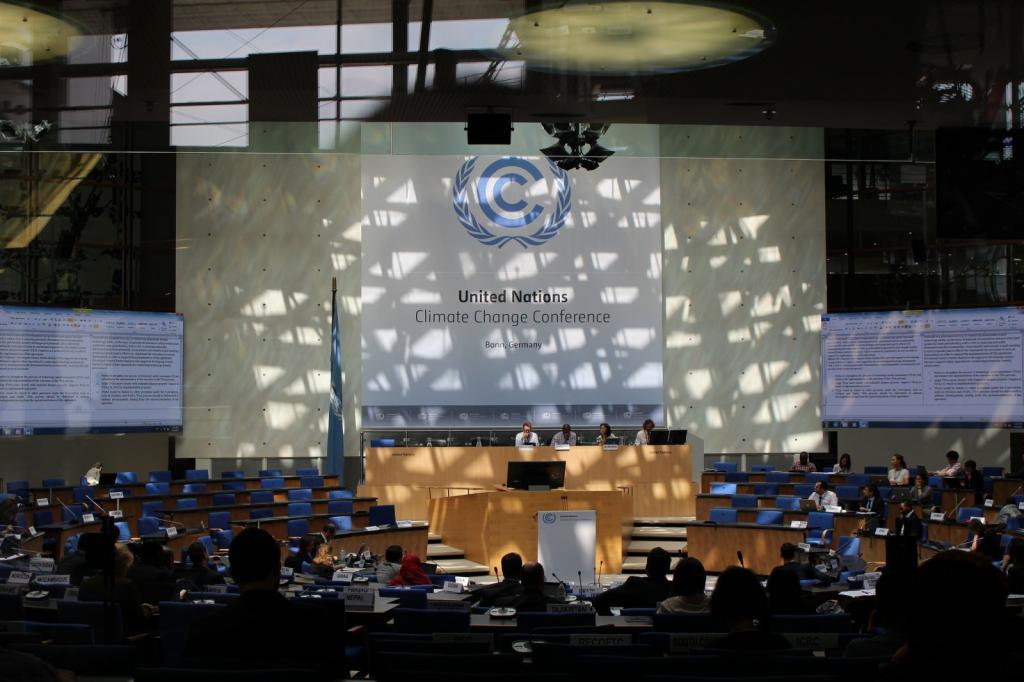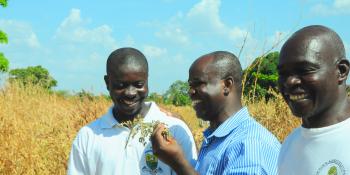Steady progress on agriculture at recent climate talks

The Bonn climate change conference marked one of several important opportunities to ensure that agriculture does not get shut out of a global climate deal in December in Paris. Did we succeed?
Agriculture was high on the agenda at this month’s meeting of the Subsidiary Body for Scientific and Technological Advice (SBSTA) of the UN Framework Convention on Climate Change (UNFCCC). The meetings presented an opportunity for science to inform discussions on critical issues related to agriculture and food security, with dedicated workshops on agriculture scheduled in the first week and plenty of side events highlighting progress at the country level. The time could not be more right, as scientists warn El Niño could disrupt food production and cause disease outbreaks worldwide.
The two official workshops on agriculture focused on the assessment of risk and vulnerability of agricultural systems to climate change, and the development of early warning systems to reduce the impacts of extreme weather events on farming and food security. Participants were highly interested and engaged, according to Sonja Vermeulen, Head of Research of the CGIAR Research Program on Climate Change, Agriculture and Food Security (CCAFS), who attended. Indeed, many parties have made submissions on the two topics, notably the Africa Group of Negotiators and G77+ China.
In preparation for the workshops, and to help inform countries’ positions on agriculture, CCAFS researchers prepared an array of background studies and briefing materials for SBSTA. The studies focused on how climate change will impact smallholder farmers, fishers and pastoralists, and reviewed some of their options for adapting. The key messages from these studies were summarized in two Info Notes:
- Improving early warning systems for agricultural resilience in Africa: Extreme climate events can undermine agriculture and rural development – how can this be avoided? The info note sets out six recommendations to African policy makers for strengthening existing and developing new early warning systems that would provide an alert of a potential weather-related disruption in food production.
- Impact of climate change on African agriculture: focus on pests and diseases: Climate change impacts on agricultural systems include a likely increase of pest and disease outbreaks, affecting crops, livestock and fisheries. This creates a new threat for Africa’s food security. One of the key recommendations is to build multi-country coordination for new and adapted pest and disease management systems that are based on sound science.

Agriculture was on the agenda at the UN Climate discussions in Bonn. Photo: V. Meadu (CCAFS) See more photos.
To complement the technical submissions, CCAFS and partners presented research and policy advances in two side events:
- Closing the gap in agriculture and climate science and policy in Africa: This side event gathered scientists, practitioners and policy makers to share scientific evidence and lessons on how vulnerability to climate change is impacting Africa’s agriculture and how farmers can be supported by governments and other development agencies to adapt. One of the key messages that emerged from the panel discussion was that scientists must work together with policy makers to avail user-friendly early warning information that has mechanisms to integrated feedback from users.
- Reducing emissions from livestock through Nationally Appropriate Mitigation Actions (NAMAS): The side event co-organized by the World Agroforestry Centre (ICRAF) focused on three active NAMA proposals in Costa Rica, Kenya and Mongolia. These examples showcased progress and pathways for countries interested in climate finance for agricultural mitigation through livestock. Participants agreed that agricultural NAMAs can finance reduced emissions while also supporting agricultural production and smallholder livelihoods.
Next steps for agriculture on the road to COP21
Despite slow progress on an overall agreement, this year’s SBSTA showed steady advances on agriculture. There is a lot of good work happening at the technical level – countries are engaged and information is being shared. This momentum should be sustained, as there will be further sessions on agriculture at SBSTA in June 2016, on topics related to adaptation measures, and agricultural practices and technologies to sustainably enhance productivity, food security and resilience. Parties and observers can make submissions to the secretariat on these topics until 9 March 2016. Our Guide to UNFCCC Negotiations on Agriculture is a useful resource for any groups interested in making submissions.
We have the urgent task of ensuring that a global framework for climate action from 2020 does not shut out agriculture
In the meantime, all sights are set on COP21 in Paris, where countries need to settle on a new global climate change agreement in December. According to George Wamukoya, Climate Change Advisor from the Common Market for Eastern and Southern Africa (COMESA), “agriculture is not going to feature in the agreement as ‘agriculture’.” If it’s not an explicit topic, this makes the challenge more critical: “we have the urgent task of ensuring that a global framework for climate action from 2020 does not shut out agriculture,” said Manyewu Mutamba, from the Southern African Confederation of Agricultural Unions.
Wamukoya, who has been working very closely with African governments in the negotiations, explained that “[agriculture] may find space [in a global agreement] through food security or resilience and low-carbon development, those types of broad areas.” Our Guide to UNFCCC Negotiations on Agriculture is a useful resource for identifying some of these entry points for agriculture.
It is likely that any UNFCCC decisions and actions on agriculture will only be made following the June 2016 session. However, it would be a huge victory for food and farming if the Paris negotiations resulted in an agreement that acknowledges the importance of agriculture for food security and livelihoods, and the role it can play to help meet global adaptation and mitigation goals.
LEARN MORE ABOUT AGRICULTURE IN THE NEGOTIATIONS:
- Access A Guide to Negotiations on Agriculture and Climate Change
- Research highlight: New briefs highlight critical agriculture issues for UN climate talks
- Opinion: Seizing the Opportunity for Agriculture in a New Climate Change Deal
- Press release: As Rising El Niño Threat Underscores Climate-Related Food Risks, Climate Panel Convenes With Farming on the Agenda
- Scientific American Article: Preemptive Genetics Girds Farmers for Climate Extremes and Disease
Vanessa Meadu is CCAFS Global Communications and Knowledge Manager. Lili Szilagyi is a student assistant at the CCAFS Coordinating Unit. Sonja Vermeulen is CCAFS Head of Research.
To follow progress on agriculture at SBSTA June 2015 please have a look at our blog series, and follow @cgiarclimate on twitter.



